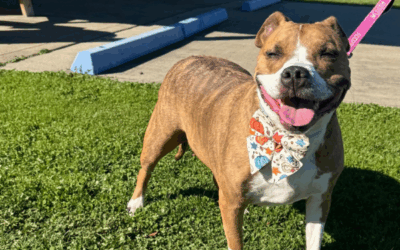MRSA – The Hidden Threat To Your Pet

Both animals and people can be colonized with MRSA, meaning the bacteria is present on skin or in nasal passages, but is not causing infection or disease. However, MRSA is also capable of causing infections in people and animals. In people, MRSA most often causes skin and soft tissue infections, sometimes with serious complications. In dogs and cats, MRSA is most often associated with skin, wound or surgical site infections, otitis, or urinary tract infections.
According to the Illinois Department of Public Health, pets can be carriers of MRSA. What to do if your pet is diagnosed with MRSA.
What is MRSA? MRSA is a type of bacteria that is resistant to some antibiotics. Although MRSA is primarily found in people, animals also can carry or be infected with the organism.
How is MRSA transmitted to people and animals? Direct skin-to-skin contact is the most common way MRSA is transmitted, but it also can be transmitted by contaminated objects such as bandages from a MRSA-infected wound. It is suspected that MRSA found in pets usually originates from humans, but pets can transmit it to people. Transmission can lead to colonization alone, infection, or both. However, once colonized or infected, dogs and cats can pass the bacterium on to other animals and people. Pets can carry MRSA in their noses and around the anus. Direct contact with these areas or tissues infected with MRSA (e.g., an infected incision) is most likely to result in transmission from pets to people.
What are the symptoms of MRSA in animals? MRSA can cause skin or wound infections.
Can a pet or person have MRSA and not be sick? Yes, people and pets can be carriers. They may carry MRSA on their skin or in their nose and have no outward signs of illness. This is called colonization with MRSA.
How is MRSA diagnosed? A swab is taken from the affected area and is submitted to a laboratory for culture. MRSA is usually diagnosed based on a bacterial culture, which can take one to three days to complete. Molecular tests are now being used that can detect MRSA in people more rapidly (hours versus days), but these tests are not used in animals. Pets tend to have the same strains that are common in people in the same geographic region. The ideal body site to culture in colonized animals is unknown, but swabs are usually taken of the nose and the area around the anus.
Do I need to get rid of my pet if it tests positive for MRSA? It is usually not necessary to get rid of a pet if it tests positive for MRSA. It is important, however, to be aware that dogs and other pets living in close contact with persons who are MRSA-infected or colonized also can become colonized with MRSA and this could result in recurrent MRSA colonization or infection in humans. Most MRSA skin infections can be prevented with proper hygiene. Healthy people rarely develop serious infections such as pneumonia, bloodstream infections, or bone infections.
How is MRSA treated? Treatment varies from case to case. If the pet is colonized, no treatment may be needed. Pets with these symptoms should be taken to their veterinarian. Purulent skin infections may undergo incision and drainage. More serious infections may require antibiotic treatment. The choice of antibiotics should depend on culture-based antimicrobial susceptibility tests.

If my pet has a MRSA infection, what can I do to avoid getting infected?
• Follow all wound care instructions from your veterinarian.
• Keep your abrasions, cuts, and scrapes clean and covered with a clean, dry bandage until healed.
• Practice good hand hygiene. You, your family, and others in close contact with the pet should wash their hands frequently with soap and warm water for at least 20 seconds, or use an alcohol-based hand sanitizer, especially after changing the infected animal’s bedding, bandages or any other objects that may have been in contact with the infected wound.
• If possible, wear disposable gloves when touching items such as the animal’s bedding, bandages or any other objects that may have been in contact with the infected wound. Perform hand hygiene after glove removal.
• Clean washable items that become soiled with hot water and laundry detergent (use bleach if possible). Drying laundry in a hot dryer, rather than air-drying, also helps kill bacteria.
• Use a household disinfectant or 1:100 dilution of household chlorine bleach to clean any surfaces contaminated by wounds or drainage. To make bleach solution mix 2 tablespoons of bleach into 1 quart of water. Be sure to mix a new bleach solution every day. Never mix bleach with other cleaners, especially ammonia.
• If anyone in your home has recently had surgery or is immunocompromised, he/she should avoid contact with the infected pet, the pet’s wound and any contaminated items such as bandage materials.

Is MRSA in animals reportable? No, MRSA in animals is not reportable. If a cluster of animal cases occurs which may have public health implications please report these to your local health department.
Infection – All MRSA strains are resistant to beta-lactam antibiotics, but because different strains may be resistant to other antibiotics as well, the bacteria must be tested in order to choose the best antibiotic. Automatically choosing the most powerful antibiotic to treat the infection when a more common drug will do can be dangerous – and expensive – because the MRSA, or other bacteria in the body, may become resistant to it, and then there may be no drug that can effectively treat it. Local treatment of skin and soft tissue MRSA infections (e.g. lancing and flushing an abscess) is often effective as well and should not be overlooked, even if the animal is also treated with antibiotics.
Infection Control for MRSA in Pets – Even though MRSA colonization is uncommon in healthy pets, if they have been exposed to a hospital environment (such as animals in hospital visitation programs) or to a person who was recently hospitalized, they may be more likely to be carrying MRSA. Hand hygiene is the simplest and most practical way to prevent transmission of MRSA between humans and animals. Use soap and water or an alcohol-based hand sanitizer on your hands.
What Should I do if my Pet is Infected with MRSA? – Don’t panic! The majority of MRSA infections can be treated effectively if they are diagnosed and appropriate treatment is started in a timely manner. No matter at what point the treatment begins, follow the treatment recommendations of your veterinarian carefully. It is especially important to completely finish any antibiotic prescriptions, as directed, even if your pet seems to be better earlier. Avoid contact with the infected area of your pet. If possible the area should be kept covered or bandaged. Wear gloves if you need to change the bandage and place all used bandage materials directly in the garbage. Wash your hands well after handling your pet, and especially after changing any bandages.
What Should I do if my pet is Colonized with MRSA?
• Animals that are positive for MRSA can stay at home if there are no high-risk people (e.g. HIV/AIDS, cancer or transplant patients) in the household. Avoid touching the pet’s nose or anal area because these are the most likely areas to harbor MRSA. Don’t allow the pet to lick a person’s face or any area of broken or damaged skin.
• MRSA-positive dogs should be walked in low-traffic areas where they are not likely to encounter other animals or people to which they may transmit MRSA through direct contact. MRSA can be found in the stool of colonized animals, so stool should be collected as promptly as possible and disposed of directly into the garbage. Wash your hands after any contact with stool or handling plastic bags containing stool since minor breaks in the bags are possible and contamination of the hands could occur.
• MRSA-positive cats should be kept indoors. Cat litter boxes should be scooped out daily. Wash your hands after cleaning the litter box.
• Although the importance of the environment in transmission of MRSA is unclear, MRSA can survive in the environment for some time. The toys and bedding of an MRSA-positive pet should regularly be changed/cleaned (daily if possible) to reduce the exposure of both the animal and people to MRSA.
• MRSA can survive in the environment for a limited period of time. However, the bacteria are susceptible to most commonly used disinfectants if the surface/equipment is cleaned properly before the disinfectant is applied.
• Hand hygiene remains the most important means of preventing transmission.
• Keep the pet off beds, and especially off of pillows used by people.

Therapy Animals – Animals that regularly visit healthcare facilities are more likely to be exposed to MRSA, and therefore are more likely to carry it. There are guidelines available to help reduce the risk of pets acquiring infectious diseases in hospitals. These include:
• Never let your pet lick a patient’s face, hands or any area of broken skin.
• Do not let patients feed your pet any treats.
• If your pet needs to be placed on a bed or patient’s lap, place your animal on a clean towel or sheet, never directly on the patient’s hospital gown or bed sheets.
• Testing or treating normal animals for MRSA is not necessary, but MRSA should be considered in these animals if they develop infections, particularly of the skin and soft tissues.
• To help prevent the spread of MRSA, wash your therapy pet’s vest after a hospital visit.
Links
Centers for Disease Control and Prevention, 2008. Community-associated methicillin-resistant Staphylococcus aureus (CA-MRSA). Available at: http://www.cdc.gov/ncidod/dhqp/ar_mrsa_ca.html. Accessed Aug 2008.
Centers for Disease Control and Prevention, 2007. Healthcare-associated methicillin-resistant Staphylococcus aureus (HA-MRSA). Available at: http://www.cdc.gov/ncidod/dhqp/ar_mrsa.html. Accessed Aug 2008.

You Might Also Like
Help Jasmine Get Adopted!
Jasmine A sweet pitbull named Jasmine is sitting at the Hancock County Animal Shelter waiting for adoption. My cousin adopted Jasmine from this shelter two years ago. Sadly, my cousin passed away recently, and the police were instructed to take Jasmine directly...
Air Quality & Pets: How To Stop Your Home From Getting Musty & Smelly
As absolutely amazing as a pet is, you can’t deny that they may give your home a certain odor. You know what we’re talking about; there’s a mustiness that comes with having a pet, which can make the quality of the air feel almost thick and a bit harder to breathe in....



0 Comments